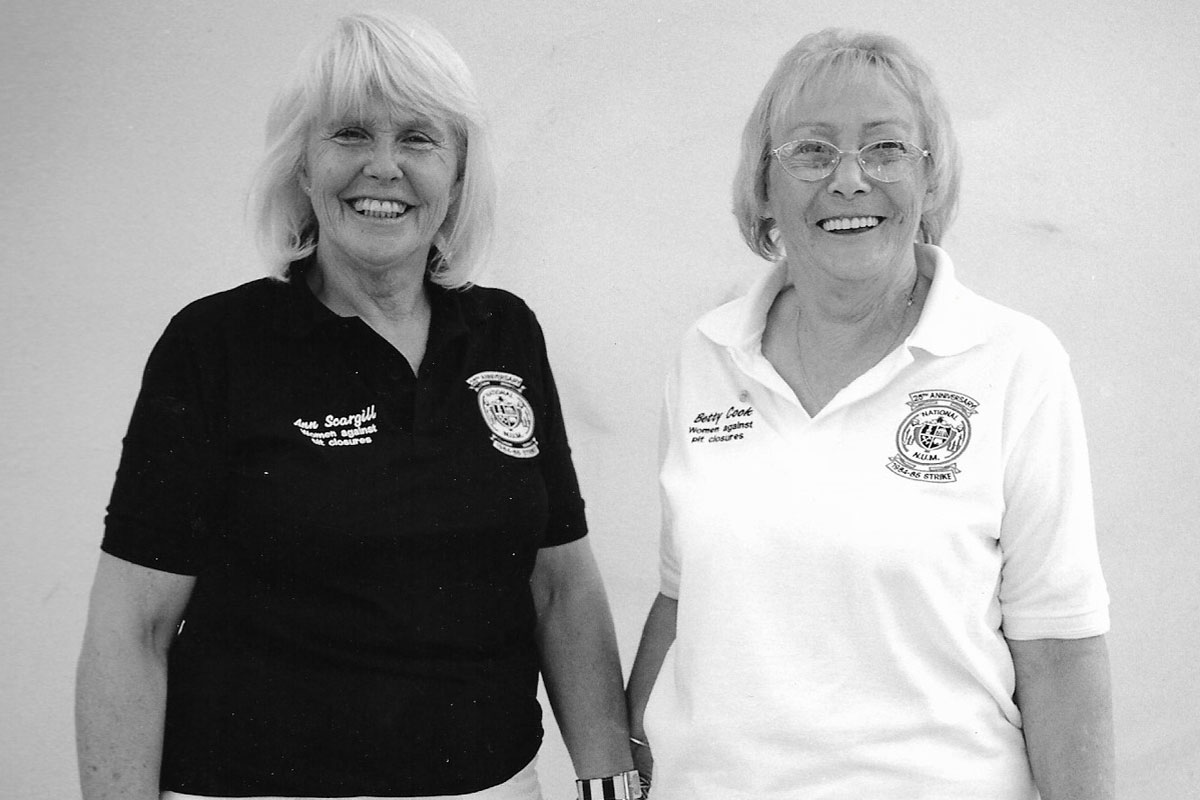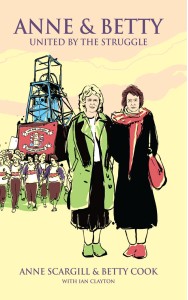Author Ian Clayton has worked with Anne Scargill and Betty Cook to help them tell their story in the joint memoir Anne & Betty: United By The Struggle. Here Ian talks about that process and puts questions to Anne and Betty about their experience of writing the book.
I think everybody who grew up in a former coal mining village knows the story. The men worked hard down the pit and fought hard to protect their livelihood when times were hard. We know as well that within that harsh male environment there was a matriarchal society that was equally tough. It was the women, like my own aunts and grandmothers, who ran the day-to-day business of keeping home, family and well-being together. And when it came to it, it was the women who spoke the best words to the powers that be who were intent on destroying a way of life.
I long admired Anne Scargill and Betty Cook and the women who campaigned first against pit closures and then for a voice for working-class women. I saw them on marches and at conferences, but I was too shy to say much more than ‘Hello’ to them. Then one day I got a phone call from Anne Scargill. She told me that Betty and herself wanted to write a joint memoir and asked me if I might consider helping them. Of course I said yes. Here was an opportunity for me that I might only dream about.
For the whole of my career as a writer I have tried to make sense of where I am from. I have a passion for working-class and social history, I love the stories of times gone by when they are told by local people and I hold the older generations in great esteem, believing that they were the ones who stood up in order to make a better life for us. The book was a joy to be involved in. It was also hard to write and emotional. Anne and Betty have not had easy lives. It was upsetting at times to see them trying to find the words to express disappointments, let downs and the situations where they knew the right thing to do and nobody was listening. It was also exhilarating to hear them talk about the times when they went into battle and refused to back down. Anne Scargill and Betty Cook are heroines of direct action and now they have produced a book that speaks louder than words.
Anne and Betty have shown as much tenacity in getting their story told in a book as they have in the many campaigns they’ve been involved in over the years. Now the book is written, I spoke with them about their experience of pulling it together.
Ian Clayton: Why did you want to write this book?
Betty: I have a big social conscience. It was important to tell this story in order to help young people coming up to understand something about their own community and where it comes from. I was once young and I have got to where I have got to through struggle, through education and through speaking up. People are still in struggle, it doesn’t end. Of course the miners’ strike and Women Against Pit Closures was what brought us together, but there are big struggles yet to come and we learn how to face the future by looking at what people did before.
Anne: I’m getting older now. I am starting to think back and make sense of what I have done in my life. When my grandkids grow up and have families of their own, I want them to read this book and know about what their grandmother was like. It’s also an opportunity for me to say something about my heroines; suffragettes like Emily Davison, the lasses at Greenham Common and the miners’ wives who stood side by side with me on the picket lines.
Ian Clayton: In the past you have told your story to a lot of people who have written about the miners’ strike, why revisit it?
Betty: Yes, academics, The Guardian newspaper, various magazines, to conferences all over the world. They have all interpreted what I said and then put their own slant on it. I thought it was about time I told my story in my own words before it’s too late.
Anne: A book is there forever. I wanted to tell some truth about what has happened. The truth of what went on when I was there. It’s like being an eye witness to your own life story.
Ian Clayton: Is this a book for women?
Betty: It’s a book for everybody. For the world out there. It’s so that people who are interested can understand how people live.
Anne: It is a book for everybody, but especially for women who stood up for themselves. A lot of coalminers were chauvinists, my dad was one, he expected his dinner on the table as soon as he walked in from work. He was a good worker and I loved him, but he expected my mother to be running about after him. It’s a book for women like my mother, but also for men like my dad, so they can learn.
Ian Clayton: Has it been an easy book to write?
Betty: No. It has brought back a lot of unhappy memories, but I think that’s the point of doing something like this. It wasn’t always nice, but it needs to be told as it was, not how we think we would like it to be. I am looking forward to holding this book in my hands though.
Anne: It has and it hasn’t. It has been sad in parts, but also exciting. I have found myself looking back at what I have put and thinking, did I do that? Whatever I have done it was needs be and I don’t regret it. It’s like that old Edith Piaf song, ‘I have no regrets.’
Ian Clayton: Who will read it?
Anne: People who like to read the truth ought to read it, because it is all true and it’s a good story.
Betty: Well, I hope anybody with a social conscience and a sense of community will and surely we all want to be that way inclined. We have a lot of friends in the trade unions, which are as important now as they have ever been, women’s groups, local people with a sense of their own history and of course all the friends we have made at home and abroad.
Ian Clayton: Are you proud of it?
Anne: It shows how people like me and Betty were prepared to stand up for what we thought was right and how we believed in the generations to come. That should make anybody proud.
Betty: I am proud. It’s a great read, without shying away from the hard times. It’s also well illustrated and it’s nice to see the different parts of life through old photographs.
Ian Clayton: What does it say about the miners’ strike, the Women Against Pit Closures movement and working-class activism that hasn’t already been said?
Betty: During the strike I met an American photographer called Rai Page. She was determined to record moments as they happened. One day, we heard about an elderly lady in Houghton who had a story she wanted to tell. This elderly lady told us some fascinating stories about the part women played in the 1926 general strike. These had never been written down, they just existed inside this one elderly lady, one of the last survivors who could remember that time in clarity and detail. I never realised that people had such stories to tell and it certainly didn’t occur to me then that somebody like that lady would write them down in a book. I feel then like I have done something that will help future generations and young women, but also pay tribute to those like that elderly lady in Houghton who were there before us.
Anne: I have always been a believer in that saying ‘actions speak louder than words’. I am much more comfortable on a picket line than I am composing a book. It has been hard to say what I have said. I do believe though that I have opened my heart as well as my mind to tell this story in my own way.

